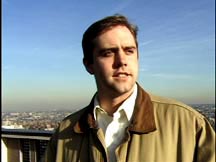|
Web Exclusives: Alumni Spotlight
February 25,
2004: James
Stanford '98: James Stanford '98 has made two documentaries that try to educate others about the modern world. And by making them he received an education on how the film business works today.
Since founding his own production company, Folkestone Productions, five years ago, Stanford completed Message in a Bubble in 2001, about the rise and fall of Internet entrepreneurs, which aired on public television stations last year. And in 2003 he made a short documentary Tomorrow's Leaders, about "students training to pick up the challenge of public policy in South Africa," he says. The Mellon Foundation and the Woodrow Wilson National Fellowship Foundation will share it with foundations, governments, and universities, he says. A longer version — "about tracking the impact on South Africa of the public policy students that I followed, won't be done for many years." After all, he says, "the students really have to live their lives before the documentary can be completed."
That is not the only challenge Stanford has encountered while making his films. He began Message in a Bubble without advanced financing and funded it through income from industrial films and commercial work. And, like many independent filmmakers who draw on friends for support, he put together a confederation of Princetonians for support. Jared Polis '96 — the chairman of several Internet companies, including Proflowers.com — emerged as the central character. Dave Nee '98 and James Brophy '99 were associate producers, Nick Merritt '99 an assistant editor, Jon Howe '98 a musical contributor, and Kate Farrell '98, Stanford's fiancée, a consultant.
When he launched the New York-based Folkestone Productions, "I believed that there would be a rise in the demand for independent documentaries," says Stanford, an English major at Princeton. He saw demand coming from the increasing number of cable channels and from distribution via the Internet. But after Message in a Bubble was finished, Stanford found the idea of the Internet as a major film distributor was still unrealized. And while some independent filmmakers have been able to make inroads into cable, his experience was that "the cable channels took most of their production in-house." Then, he says, "the commercial market fell through. ... I had been doing a lot of commercials for Sony, EchoStar/the Dish Network, Club Med ... and after 9/11 the market disappeared."
At the same time, technological advances in film have been "both the blessing and the curse," he says. "Digital technology has made filmmaking much, much cheaper. ... [But] anyone can make a film ... so there's too much stuff that clogs up real distribution."
Last summer Stanford realized that his film/video business was not financially viable. But his entrepreneurial efforts on behalf of Folkestone helped him land him a new job in Washington, D.C., working in marketing for the Advisory Board Co., an organization providing research and analysis to the health-care industry. "My new employer saw Folkestone as an equivalent of business school," he says. Although filmmaking isn't a full-time gig anymore, Stanford says
he learned a lot. It's a business where he found "you have
to be very comfortable with rejection, and willing to do anything
to get the film made." And he says he has ideas for more movies
(though he declined to say what the ideas were)."Filmmaking,
he adds," is "an incredibly personally rewarding endeavor."
By Rich Heldenfels '73 Rich Heldenfels writes mainly about television for the Akron Beacon Journal.
Home Current
Issue
Web Exclusives: Headlines - PawPlus - Features Tooke's Take - Varsity Typewriter - Inky Dinky Do Raising Kate - On the Campus - Comparative Life - More... PAW Online Archives - Print Archives - Advertising Info - Reader Services Search the Site - Contact PAW Princeton University - Alumni Links - Alumni Council - Your Class Secretary |
|||

